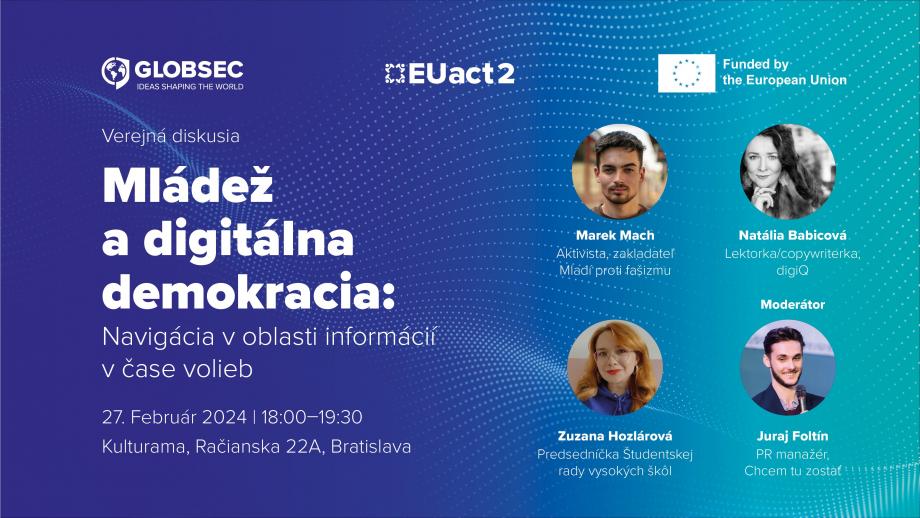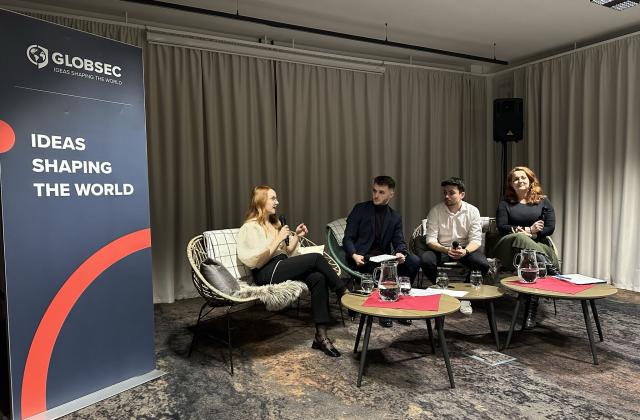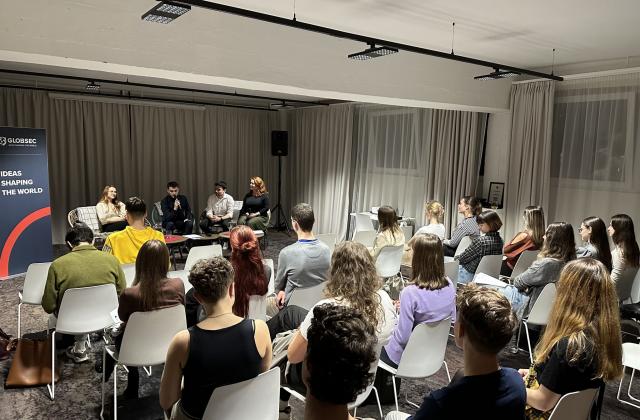Event Summary: Youth and Digital Democracy: Navigating Information in Times of Elections

The public discussion titled "Youth and Digital Democracy," organized by GLOBSEC as part of the EUact2 project, was held on the 27th of February 2024 in Bratislava, Slovakia. The event was dedicated to exploring the role of young people within the digital space in the context of two upcoming elections in Slovakia – the presidential and the European Parliament elections.
Three speakers were invited to share their perspectives on the challenges connected to disinformation, cyber threats and digital literacy among young people. The panel was joined by Marek Mach, activist and founder of Mladí proti fašizmu (Youth against fascism), Zuzana Hozlárová, President of the Student Council for Higher Education, and Natália Babicová, lecturer and copywriter at digiQ. The discussion was moderated by Juraj Foltín from the initiative Chcem tu zostať (I want to stay here). The audience consisted of young people and students as well as experts who work with digital and disinformation topics. All three speakers provided interesting perspectives that resonated with the audience and led to a lively and interactive discussion.
Ms. Babicová's primary focus centers around educating on cybersecurity, critical thinking, and fostering digital citizenship skills and norms. Within her organization, she conducts workshops for diverse user groups, ranging from the youngest (elementary and middle school students) to the oldest (seniors requiring a more specialized approach). DigiQ takes a continuous teaching approach, training young people in small groups, enabling them to subsequently share their knowledge with each other through a peer-to-peer learning model.
Ms. Hozlárová shared her insights into leveraging digital space within academic circles. The Student Council for Higher Education of Slovakia, an official body representing students nationwide, actively maintains its online presence, predominantly through social media platforms. This mode of communication proved particularly resonant during the challenging times of the COVID-19 pandemic and continues to be influential today. Recognizing the potency of social media as a powerful tool for engaging with young people due to its accessibility, the Student Council, as a legal entity, endeavors to strike a fair balance in its communication style – sufficiently attention-grabbing yet maintaining a formal and professional tone.
Mr. Mach's initiative consistently uses social media as a key component of its outreach strategy. Platforms such as Instagram, Facebook, and occasionally TikTok and X are utilized to share informative content on topics connected to domestic politics, history, and hybrid threats, especially targeting a young audience. As emphasized by Mr. Mach, one notable advantage of leveraging social media is the ability to build a closer community of followers around specific themes, enabling easy mobilization and the potential for a more substantial influence in the future.
Key takeaways:
- Digital citizenship mirrors real-life conduct, requiring adherence to similar norms and responsibilities. Offenses like hate speech or threats, whether online or offline, should be treated equivalently by authorities. Currently, in Slovakia, resources for handling social media reports are limited, with only 11 personnel, per Ms. Babicová's data.
- Middle school and high school students spend about 7-8 hours online, according to Mr. Mach's research. Much of the content lacks educational value, potentially influencing their choices and mental health. Children often encounter age-inappropriate content early on, shaping their perspectives. While a complete ban on mobile phones is not deemed effective, speakers unanimously agreed on the need for enhanced regulations.
- University students increasingly rely on artificial intelligence (AI) for tasks like information searches and paper writing. While academic ethics support AI use to enhance effectiveness, concerns about fairness and transparency arise. Outright AI bans may not deter students but simply make the practice illegal. A more practical solution lies in clear and fair guidelines. Despite the EU AI Act adoption in June 2023, only 2 out of 32 Slovakian universities have established AI usage directives, as reported by Ms. Hozlárová.
- Delving into the online landscape, concerns about algorithms and a lack of transparency have surfaced. Mr. Foltín highlighted how political marketing students found that algorithms often channel information into specific bubbles, excluding diverse opinions and posing a potential threat to democracy. Ms. Babicová noted that starting in February 2024, the EU implemented the Digital Services Act (DSA) to enhance digital safety and increase algorithm transparency. However, the responsibility falls on individual member states to ensure proper implementation and adherence to these regulations.
How do we protect digital democracy?
- By resisting disinformation and enhancing human capital through self-education and exposure to diverse perspectives.
- By staying well-informed to make conscious choices, emphasizing the importance of informed decision-making.
- By keeping up with digital developments and actively learning about and discussing cyber threats rather than overlooking them.
- By being cautious when filtering daily content and being mindful of the influence of AI and technologies like deepfakes.
- By utilizing your voice through voting in elections, recognizing it as a fundamental mechanism vital to the integrity of democracy.

